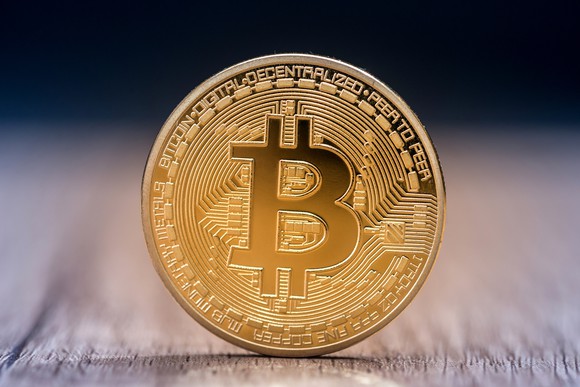It's time to face the facts: 2017 belongs to cryptocurrencies. While we might look back and point to certain industries that outperformed (ahem, marijuana), it'll be digital currencies like bitcoin that take all the glory. Since the year began, the aggregate market cap of all cryptocurrencies is up more than 850%, which has taken the broad-based S&P 500 decades to achieve.
Bitcoin, the largest and most popular virtual currency by market cap, has seen its market cap explode by more than 500% this year to $98 billion. In fact, it briefly topped the $100 billion mark recently for the first time. With a market cap this high, institutional investors can no longer sweep bitcoin under the rug or choose to ignore it.

Image source: Getty Images.
Bitcoin's market cap is now larger than some Dow stocks
What's perhaps most noteworthy about bitcoin's 2017 performance is that its gains have allowed its market cap to surpass five storied Dow Jones Industrial Average (^DJI +0.47%) components. The 121-year-old Dow is the most iconic, but outdated, stock market index in the world, so bitcoin's market cap surpassing a handful of its components is in fact a big psychological deal.
Here are the five Dow components that are now looking up to bitcoin in terms of market cap (with their market caps in parenthesis).

Image source: Getty Images.
The Travelers Companies: $36.1 billion
The "Mighty Mouse" of the Dow in terms of market cap is Travelers Companies (TRV 0.27%), a provider of commercial, personal property, and casualty insurance that generated nearly $25 billion in revenue last year, along with full-year net income that topped $3 billion.
Though insurers such as Travelers are exposed to catastrophe losses from time to time (e.g., hurricanes Harvey and Irma), they can use their pricing power to their advantage. Following disasters, insurers often have little issue boosting their premiums to rebuild their cash reserves. But they can also outpace inflation with premium hikes during catastrophe lulls, with the viable reasoning that it's not a matter of "if" but "when" with regard to the next natural disaster.
Insurers like Travelers that have a large pool of cash invested in short-term, safe securities like Treasury bonds should also benefit from the Fed's monetary tightening. Higher interest rates are icing on the cake for Travelers and the insurance industry. Nonetheless, its market cap is now well behind that of bitcoin.

Image source: Getty Images.
Caterpillar: $81.5 billion
Despite one heck of a comeback in its share price in 2017, construction and heavy-duty machinery manufacturer Caterpillar (CAT +2.16%) checks in with the second-smallest Dow market cap of $81.5 billion. Mind you, this is a company that generated $38.5 billion in full-year sales in 2016.
Caterpillar's business is perhaps the most cyclical of any Dow component. It almost always requires strong global growth and a healthy mining industry to lift sales. In recent quarters, the company's restructuring efforts have paid off, and the company's management is beginning to see strength in three core industries: construction, energy, and mining.
In particular, Caterpillar is poised to benefit domestically if the Trump administration follows through with plans for a $500 billion to $1 trillion decade-long infrastructure bill that would focus on rebuilding and repairing our nation's aging roads, bridges, and airports. The company has also seen strength from a stabilization in gold and silver prices, as well as coal.
Still, Caterpillar will need a double-digit percentage gain from here on out to dig its way out from behind bitcoin.

Image source: Getty Images.
American Express: $84.5 billion
Believe it or not, credit and lending giant American Express (AXP +0.37%) also finds itself trailing bitcoin by a sizable margin in terms of market cap, despite the fact that it generated $32.1 billion in total revenue net of interest expenses last year, along with $5.28 billion in diluted net income.
American Express' stock hit the skids for a short period in 2015 and 2016, when it was announced that its profitable partnership with Costco (COST 0.66%) would be coming to an end. At the time of the announcement, Costco comprised roughly a fifth of AmEx's loans, as well as 10% of its total global cards in circulation.
But American Express has rebounded in a big way. The company continues to focus on its core affluent customer, who is traditionally more resilient to economic hiccups and possesses a better credit score than the average American. AmEx has also benefited from record-high APRs on credit cards that go along with higher interest rates. If the U.S. and global economies keep expanding, it may have a chance to surpass bitcoin in market cap once again.

Nike ambassador Serena Williams. Image source: Nike.
Nike: $92.9 billion
Global footwear and accessories retailer Nike (NKE 10.86%) may be off and running following another solid quarter of earnings, but it's currently trailing bitcoin in terms of market cap by about $5 billion, even after producing $34.4 billion in global sales and $4.2 billion in net income in fiscal 2017.
The iconic footwear company has had its ups and downs in recent years in China, and has struggled with high volatility in foreign currency markets, but it continues to be set up for future success. A burgeoning middle-class in emerging market economies are eager for affordable luxuries, which brand-name footwear and accessories company Nike can provide. In its latest reported quarter, the company delivered 12% constant currency growth in China, along with 5% constant currency sales growth in Europe, the Middle East, and Africa. Its well-recognized brand-name and high-profile ambassadors play a key role in drawing new and returning customers to its brand.
Like some of the other companies discussed here, Nike is certainly cyclical and dependent on global growth to drive its results. However, its push into foreign markets is helping to ease the peak to trough sales dips that shareholders are used to seeing with retailers.

A Kidde smoke alarm. Image source: United Technologies.
United Technologies: $95.8 billion
Last, but not least, industrial giant United Technologies (UTX +2.57%), which is best known as the company behind Pratt & Whitney aircraft engines and Otis elevators, recently took a back seat to bitcoin in terms of market cap. Bitcoin is larger despite United Technologies' generating $57.2 billion in full-year sales last year, to go along with $5.1 billion in full-year net income.
Of the Dow components on this list, perhaps United Technologies has had the fewest issues of all in recent years. Though it does rely on government contracts for a portion of its business, and the federal government has been known to be fickle with its spending habits, it's seen pretty steady demand from each of its four operating segments (Otis, Pratt & Whitney, Aerospace Systems, and Climate, Controls, and Security).
United Technologies also benefits as a result of its healthy backlogs across many of its operating segments. The company recently announced plans to hire up to 25,000 new employees to Pratt & Whitney to handle a backlog of more than 8,000 geared turbofan engines for civil aircraft. Similar healthy backlogs exist in its Aerospace operating segment, which can help shield the company in times of economic contraction.
While this investor continues to believe bitcoin could be on the verge of bubble territory, we can't deny that it's left some storied Dow components eating its dust.
